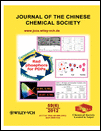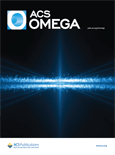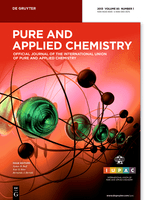
Revista Virtual de Quimica
Scope & Guideline
Bridging Disciplines with Cutting-edge Chemistry Insights
Introduction
Aims and Scopes
- Sustainable Chemistry:
The journal emphasizes research on sustainable practices in chemistry, including the use of green solvents, waste valorization, and the development of eco-friendly chemical processes. - Analytical Chemistry:
A significant portion of publications focuses on analytical techniques, including spectroscopy, chromatography, and mass spectrometry, to assess chemical compositions and environmental pollutants. - Chemical Education:
The journal promotes innovative teaching methodologies in chemistry, integrating practical experiments and modern educational tools to enhance learning outcomes in educational settings. - Natural Products Chemistry:
Research on bioactive compounds derived from natural sources, including plants and microorganisms, is frequently featured, highlighting their potential therapeutic applications. - Materials Chemistry:
The journal covers advancements in the synthesis and characterization of new materials, particularly those with applications in energy, catalysis, and environmental remediation. - Interdisciplinary Approaches:
Emphasizing the intersection of chemistry with other scientific fields, the journal encourages interdisciplinary studies that address complex societal and environmental challenges.
Trending and Emerging
- Green Chemistry and Sustainability:
A strong trend towards sustainability is evident, with an increasing number of publications focused on green chemistry practices, waste reduction, and environmentally friendly processes. - Biochemistry and Pharmacology:
Research in biochemistry, particularly related to drug development and the therapeutic potential of natural products, is gaining prominence, reflecting a broader interest in health-related applications. - Nanotechnology and Materials Science:
The exploration of nanomaterials and their applications in various fields, including medicine and environmental science, is on the rise, indicating a growing interest in advanced materials. - Environmental Chemistry:
There is an increasing focus on environmental issues, particularly the assessment and remediation of pollutants, which aligns with global sustainability goals. - Digital and Remote Learning in Chemistry Education:
The adaptation of digital tools and methodologies for teaching chemistry, especially in the context of the COVID-19 pandemic, is emerging as a significant area of research.
Declining or Waning
- Traditional Synthetic Methods:
There has been a noticeable decrease in publications focused on traditional synthetic methodologies, possibly due to a growing interest in greener and more sustainable alternatives. - Historical Perspectives in Chemistry:
Research papers centered on historical analysis and perspectives in chemistry have become less frequent, as the journal shifts focus towards contemporary and applied research. - Basic Chemical Theory:
The exploration of fundamental chemical theories and principles appears to be waning, with more emphasis now placed on practical applications and technological advancements. - Inorganic Chemistry:
Topics specifically related to inorganic chemistry, particularly traditional coordination chemistry, have seen reduced representation in favor of more applied and interdisciplinary studies.
Similar Journals

JOURNAL OF ANALYTICAL CHEMISTRY
Innovating Insights in Analytical ChemistryJOURNAL OF ANALYTICAL CHEMISTRY, published by PLEIADES PUBLISHING INC, stands as a pivotal resource in the field of analytical chemistry, offering an innovative platform for researchers, professionals, and students to advance their knowledge and contribute to the discourse within the discipline. With an ISSN of 1061-9348 and an E-ISSN of 1608-3199, this journal features a focused exploration of analytical methodologies, instrumentation developments, and applications across various domains, contributing to practical and theoretical advancements in the field. Currently ranked in the Q3 category in Analytical Chemistry with a Scopus rank of #111 out of 156, it provides critical insights and innovation strategies for professionals aiming to enhance their analytical capabilities. Access to the journal is through standard subscription models, and it covers an extensive range of topics pertinent to the discipline from 1996 to 2024. Engage with the JOURNAL OF ANALYTICAL CHEMISTRY to be part of a vibrant research community dedicated to push the boundaries of analytical practices.

JOURNAL OF THE CHINESE CHEMICAL SOCIETY
Navigating the Landscape of Chemical AdvancementsJOURNAL OF THE CHINESE CHEMICAL SOCIETY, published by WILEY-V C H VERLAG GMBH, is a vital resource in the field of chemistry, focusing on a broad array of topics pertinent to general chemistry and its advancing sub-disciplines. Established in 1954 and running through 2024, this journal serves as a significant platform for the dissemination of high-quality research, showcasing innovative findings and developments within the chemical sciences. With its Q3 category ranking and positioning at Rank #203 in General Chemistry per Scopus, it reflects the journal's commitment to research excellence and impact. While not an open-access publication, it ensures accessibility to a global audience, making it an essential tool for researchers, professionals, and students alike seeking to stay informed and engaged in the evolving landscape of chemistry.

Bulletin of the University of Karaganda-Chemistry
Empowering Scholars with Open Access Chemistry InsightsBulletin of the University of Karaganda-Chemistry is an esteemed academic journal published by KARAGANDA STATE UNIVERSITY, focusing on the field of chemistry and related disciplines. With an ISSN of 2518-718X and an E-ISSN of 2663-4872, this journal aims to disseminate high-quality research articles, reviews, and scholarly discussions that contribute to the advancement of knowledge in chemistry. Although it has experienced a transition in its coverage from 2021 to 2022, the journal remains a significant platform for researchers and students alike, promoting open access to its valuable content. Despite its current Scopus rank of #379/407 in the general chemistry category, the Bulletin of the University of Karaganda-Chemistry serves as a vital resource for the academic community in Kazakhstan and beyond, fostering collaboration and innovation in various chemical research domains. Researchers, professionals, and students are encouraged to engage with the journal as it continues to evolve and contribute to significant scientific discussions.

Moroccan Journal of Chemistry
Bridging Local Insights with Global Chemistry Research.Moroccan Journal of Chemistry, published by the University Mohammed Premier Oujda, serves as a pivotal platform for researchers and professionals in the field of chemistry, particularly focusing on diverse and emerging areas within the discipline. Established in 2018, this open-access journal facilitates widespread dissemination of scholarly articles, ensuring that cutting-edge research reaches a global audience. With an ISSN of 2351-812X and categorized in the Q3 quartile for miscellaneous chemistry in 2023, the journal maintains rigorous peer-review standards while fostering an inclusive environment for scientific dialogue. Located in Morocco, it aims to bridge local and international research communities, contributing to the advancement of knowledge in chemistry. As it continues to grow, the Moroccan Journal of Chemistry remains an essential resource for students, educators, and professionals eager to stay abreast of the latest developments in the field.

Acta Chemica Iasi
Advancing Chemistry Through Open Access InnovationActa Chemica Iasi is a distinguished open-access journal dedicated to advancing the field of chemistry, published by the esteemed ALEXANDRU IOAN CUZA UNIVERSITY PRESS located in Iasi, Romania. Since its inception, this journal has served as a vital platform for the dissemination of significant research findings, theoretical advancements, and methodological innovations in various chemistry disciplines. As an open-access publication since 2013, it provides unrestricted access to high-quality articles, fostering collaboration and knowledge sharing among researchers, professionals, and students globally. Although specific metrics such as H-Index and Scopus rankings may be forthcoming, the journal's commitment to rigor and excellence ensures that it remains an invaluable resource for those seeking to stay at the forefront of chemical research. With a focus on promoting scientific inquiry and innovation, Acta Chemica Iasi continues to uphold a legacy of scholarly excellence and contribution to the chemical sciences.

REVUE ROUMAINE DE CHIMIE
Connecting Local Expertise to Global Chemistry ChallengesREVUE ROUMAINE DE CHIMIE is a distinguished academic journal in the field of chemistry, published by EDITURA ACAD ROMANE in Romania. With an ISSN of 0035-3930, this journal has been a valuable platform for disseminating original research and insights in the diverse realm of chemistry since its inception. The journal currently operates under a competitive tier, categorized in Q4 for miscellaneous chemistry fields, as reflected in its Scopus ranking of #348 out of 408, placing it within the 14th percentile. Aiming to foster scientific discourse and innovation, the REVUE ROUMAINE DE CHIMIE provides a repository of knowledge that is crucial for researchers, professionals, and students eager to advance their understanding and contribute to the global chemistry community. By bridging local and international research initiatives, this journal plays an essential role in enhancing the visibility of Romanian scientific contributions on the world stage.

ACS Omega
Pioneering Research, Shaping the Future of Chemistry.ACS Omega is a prominent open-access journal published by the American Chemical Society that has been serving the global research community since its inception in 2016. With ISSN 2470-1343, it focuses on a wide array of topics within the realm of Chemistry and Chemical Engineering, making it a crucial platform for researchers and practitioners aiming to disseminate significant findings across these disciplines. The journal maintains an impressive standing, ranking in the Q2 quartile for both Chemical Engineering and Chemistry categories, highlighting its impact and relevance in contemporary research. Additionally, with its Scopus ranks placing it within the top 24% and 27% of General Chemistry and General Chemical Engineering respectively, ACS Omega continues to foster innovation and facilitate collaboration among scientists. As an Open Access journal, it ensures that research outputs are freely available to all, enhancing the accessibility and visibility of contributors’ work, thus playing a critical role in advancing scientific knowledge globally from its headquarters in Washington, D.C.

PURE AND APPLIED CHEMISTRY
Unveiling the Practical Side of ChemistryPURE AND APPLIED CHEMISTRY is a highly regarded journal in the fields of chemical engineering and general chemistry, published by Walter de Gruyter GmbH. Since its inception in 1960, this journal has continued to foster advancements in chemical research and facilitate the dissemination of new knowledge through its rigorous peer-reviewed articles. With an impressive impact factor that places it in Q2 quartile rankings for both Chemical Engineering and Chemistry as of 2023, it holds a significant position in the academic landscape, attracting authors and contributors from around the globe. The journal’s unique focus on the practical applications of chemical research makes it indispensable for researchers, professionals, and students aiming to bridge theoretical knowledge with real-world applications. Although it is not open access, its impact is enhanced by its continued relevance and contributions to the ever-evolving field of chemistry. Researchers and practitioners alike will find in PURE AND APPLIED CHEMISTRY a critical resource for staying updated on key developments and innovative practices in chemistry and chemical engineering.

BMC Chemistry
Empowering Discoveries in the World of ChemistryBMC Chemistry, published by BMC, is a reputable open access journal that has made significant strides since its inception in 2019. Operating under e-ISSN 2661-801X, this journal is dedicated to advancing the field of general chemistry by promoting high-quality research across various sub-disciplines. Headquartered in the United Kingdom, BMC Chemistry boasts a commendable impact factor and is classified in Q2 within the prestigious field of Chemistry (miscellaneous) according to the 2023 category quartiles. The journal's Scopus ranking places it at #139 out of 408 in its category, highlighting its growing relevance and influence in the academic community, with a commendable 66th percentile standing. With a commitment to open access, BMC Chemistry ensures that groundbreaking discoveries and innovative research are available to a global audience, fostering collaboration and development in chemistry. Researchers, professionals, and students alike will find this journal to be an invaluable resource for disseminating knowledge and driving scientific advancement.

Studia Universitatis Babes-Bolyai Chemia
A Platform for Emerging Voices in ChemistryStudia Universitatis Babes-Bolyai Chemia, published by UNIV BABES-BOLYAI in Romania, serves as a pivotal platform for the dissemination of innovative research in the field of chemistry. With an ISSN of 1224-7154, this journal has been actively publishing since 2009 and aims to foster scientific collaboration and knowledge sharing among researchers, professionals, and students alike. Although currently categorized in Q4 of the Chemistry (miscellaneous) field, the journal provides an essential venue for emerging studies that contribute to the diverse landscape of chemical research. With its commitment to accessibility and scholarly discourse, Studia Universitatis Babes-Bolyai Chemia remains an important resource for those seeking to stay abreast of the latest developments and trends in general chemistry, holding a Scopus rank within the lower quartiles. Researchers and practitioners are encouraged to engage with its content to enrich their own work and to aid in the advancement of the scientific community.